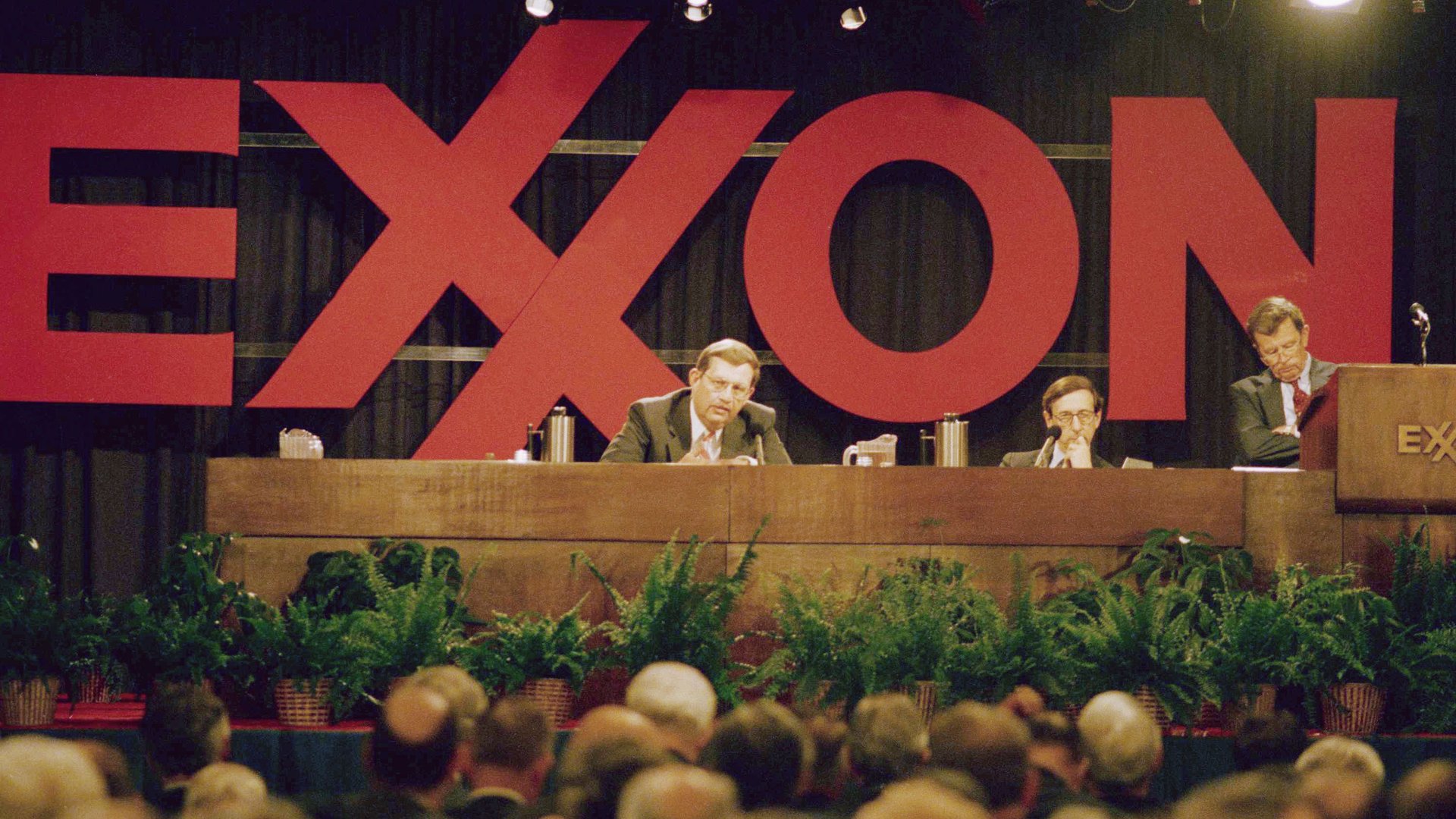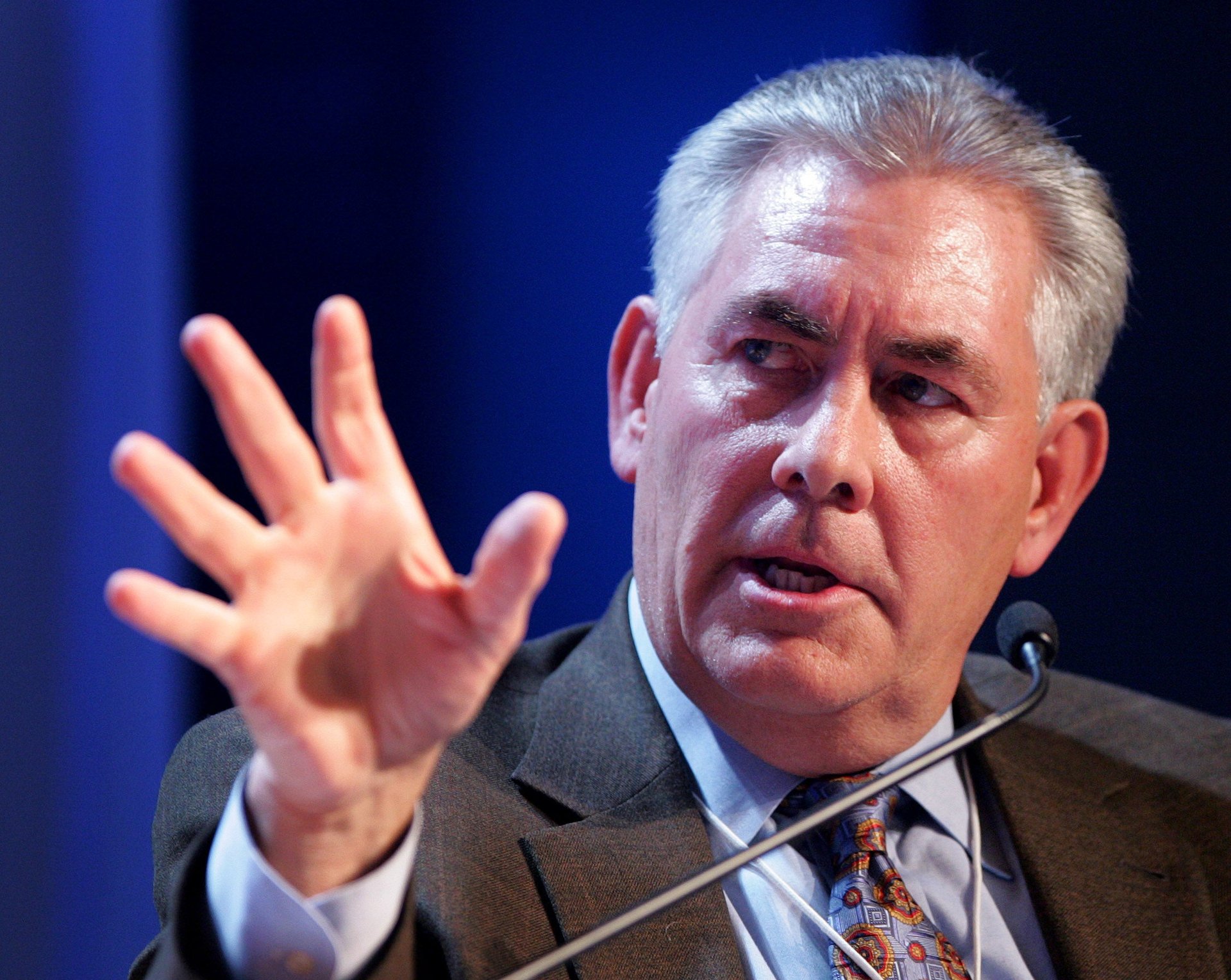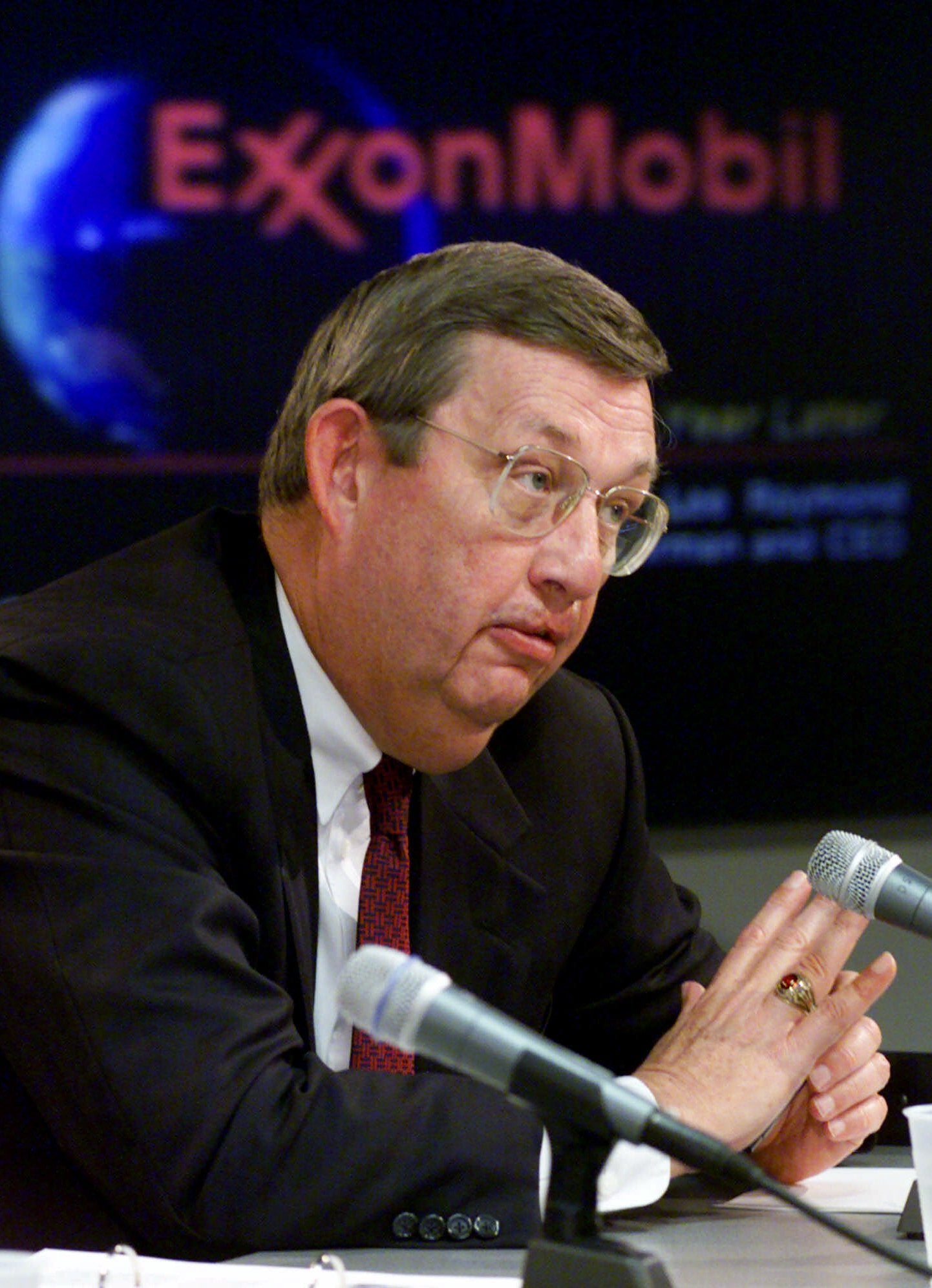ExxonMobil pioneered climate-change research in the 1970s, and now it’s attacking media reporting on that
For years, ExxonMobil has been running away from the environmental politics of former CEO Lee Raymond, a salty-tongued chemist who spent millions of company money to fund writers and foundations to sow scientific doubt about climate change.


For years, ExxonMobil has been running away from the environmental politics of former CEO Lee Raymond, a salty-tongued chemist who spent millions of company money to fund writers and foundations to sow scientific doubt about climate change.
Although Raymond retired a decade ago, his hand remains visible in the undercurrent of US skepticism toward climate change that began in the 1990s and has flowed through US politics ever since. But new reports suggest an even more complex legacy—that Raymond, while he was leading the charge to undermine near-consensus climate science, had access to pioneering, Exxon-produced studies that meticulously documented the potential perils of climate change.
Beginning in 1977, Exxon scientists began to produce a decade of papers that described a general scientific consensus that the burning of fossil fuels was changing global climate. It was not yet knowable whether the planet was undergoing a heating trend, but if it was, temperatures could rise by three to 10 degrees Celsius, one early paper said. In the late 1980s, however, Exxon abruptly embraced a message that scientists were exaggerating how much they knew, and that the risk was that they were utterly wrong. In full-throated public statements, Raymond himself said he did not believe the planet was warming.
The possible legal ramifications of the Exxon paper trail are that the company could potentially be shown in a court to have deliberately squelched scientifically based evidence that effectively accepted the consensus view. Science is rarely incontrovertible, but, as the tobacco industry was fined a decade ago for having lied about the dangers of cigarettes, Exxon could be liable for stiff penalties should it be shown to have purposely misled the public for corporate gain.
This presents Exxon with a tougher task than merely distancing itself from Raymond’s most extreme policies: It includes simultaneously discrediting the new reports of its climate-change knowledge, both stomping on and embracing Raymond’s history, and meanwhile burnishing its climate-change credentials.

If it looks like a mess, if not a corporate crisis, ExxonMobil appears to think it is, too, judging by how it is responding.
The reason seems simple: The reports—produced in recent weeks by InsideClimate News, a Pulitzer Prize-winning, digital newsletter, and by a combined team from the Columbia University Journalism School and the Los Angeles Times—are attracting uncomfortable national attention.
Democratic presidential candidates Bernie Sanders and Martin O’Malley have separately urged a US government probe to investigate if ExxonMobil deliberately concealed internal conclusions that climate change could cause cataclysmic global damage.
A former prosecutor in the successful 2006 US racketeering case against tobacco companies has asserted that similar charges might be warranted against ExxonMobil.
The fierce political reaction isn’t surprising, given the heated presidential race. Neither is ExxonMobil’s ferocious defense: at least since the 1969 Santa Barbara oil spill by Unocal, a considerable segment of the American public has reserved outsized suspicion for Big Oil. In this case, polls show that a majority of Americans would like to see global warming addressed (pdf slides 21 and 25).
There is no use speculating as to the probability or not of actual charges, but ExxonMobil, judging by its response to date, wishes to head off this potential risk (and if so, its strategy aligns with a corporate trend of using the same social media-tools that are shaking up conventional media, the FT writes.).
Company spokesman Alan Jeffers dismissed the InsideClimate News report as biased work.
“InsideClimate News is funded by anti-oil and gas foundations and activists and based on the inaccurate and biased reporting we’ve seen can be considered anti-oil and gas activists,” Jeffers said in an e-mail responding to a query from Quartz. “I would challenge to you find a single story on their site that you’d consider a fair and balanced treatment of the industry, the benefits it provides to society and its importance to modern life.”
“Exxon in essence denies that it ever tried to deny climate change, though there is a large record of its efforts,” Neela Banerjee, lead reporter for the InsideClimate News series, told Quartz. “We asked many detailed questions of Exxon and the company went silent in our private communications pretty early. Instead, it has resorted to name-calling in public.”
Raymond simply did not believe the climate science
Raymond was a Ph.D chemist who was equally respected and reviled on Wall Street—he was widely regarded as the sharpest business mind in Big Oil, and also one of its least-tolerant, politically incorrect executives. If you displeased him, watch out.

This portrait spills out on the pages of Private Empire, a history of ExxonMobil published in 2012 by Steve Coll, a double-Pulitzer Prize-winning staff writer at The New Yorker, and now the dean of the Columbia University School of Journalism. Coll sums up Raymond this way: “He delivered profits; he ignored criticism.”
One subject that particularly riled Raymond was the evolving science of climate change—he simply did not believe the increasing number of forecasts of a heating planet, less a human role in any such ongoing phenomenon. The most pressing environmental problem on the planet is “poverty, not global climate change,” he said in 1997.
But he went further than mere skepticism. Numerous reports detail Raymond’s expenditure of millions of corporate dollars on a campaign, sometimes surruptitiously through front groups, to discredit climate researchers, including this 2007 study by the Union of Concerned Scientists.
With the campaign, Coll wrote, the company “self-consciously invested in the dissemination of doubt about climate change,” in a pattern that “crossed into disinformation.” (In response, company spokesman Jeffers told Quartz: “We reject long-discredited conspiracy theories that labeled legitimate scientific observations as climate denial.”)
In 2005, Raymond retired, and Exxon’s board chose as his successor Rex Tillerson—a polished, much less grouchy CEO, who remains in the post today. Tillerson especially quieted down the company’s anti-climate change rhetoric. While at first that did not mean an actual change in policy, since 2009—with the election of president Barack Obama—Tillerson has advocated action (paywall) on climate change through the imposition of a carbon tax.
What Exxon knew and when it knew it
Raymond’s attitude and his politics—while repulsive to his critics, especially since much of it was stealthy guerrilla warfare conducted from behind a curtain—did not appear to cross any legal boundaries.
Proof that tobacco companies knew cigarettes were unhealthy, yet financed studies and gave testimony saying the opposite, was the smoking gun that doomed the industry. But Exxon under Raymond had not previously been seen to have “maliciously distorted in-house scientific research,” Coll wrote.
But now, the news reports, relying on previously little-known papers and documents, many of them housed in an ExxonMobil archive at the University of Texas, allege that the company knew much more than it owned up to.
As far as mainstream outside researchers knew, there had been no ExxonMobil examination of climate change prior to Raymond himself initiating it. But in an eight-month investigation, InsideClimate News reporters studied a trove of serious internal Exxon studies of climate change going back as early as 1977, long before the subject had surfaced in national public or political discourse. There is no immediately apparent record of anyone previously examining the studies, which are archived at the university’s Briscoe Center for American History.
The lead piece in the website’s climate series describes a senior Exxon scientist named James F. Black standing before the company’s all-powerful Management Committee, a small group that, going back to John D. Rockefeller in the late 19th century, decided all corporate matters. To gain admission to the Management Committee was no easy matter.
“There is general scientific agreement that the most likely manner in which mankind is influencing the global climate is through carbon dioxide release from the burning of fossil fuels,” Black told Exxon’s most senior executives. He went on to say, “some countries would benefit but others would have their agricultural output reduced or destroyed.”
The series documents the subsequent decade-long corporate study of the impact of fossil fuels on the climate, relying on interviews with those involved, in addition to papers from the archive. The Exxon scientists conducting the studies were proud of their work—they judged themselves on par with Bell Laboratories as private researchers on the cutting edge of an important scientific subject.
That’s also the way it was seen by US government officials privy to the work. One, from the Department of Energy, wrote to Exxon in 1979, “We are very pleased with Exxon’s research intentions related to the CO2 question. This represents very responsible action, which we hope will serve as a model for research contributions from the corporate sector. This is truly a national and international service.”
Along the way, a consensus developed that the ramifications of climate change were perilous. As far as a response, one option was to keep measuring to see whether warming was really happening. The only trouble with that course, one scientist said, was that by the time you had incontrovertible evidence, it might be too late to do anything.
In 1990, according to a piece published Oct. 23 in the LA Times, Exxon made a choice—in terms of its public policy, it would ignore the nuances of the climate science and emphasize the uncertainties.
Exxon’s manager of science and strategy development told fellow executives that acting against climate change would entail curtailing the use of fossil fuels, or draconian regulation of emissions, that would would “alter profoundly the strategic direction of the energy industry.” The impact on Exxon itself “will come sooner … than from climate change itself,” he said. The best course to avoid damaging the company’s prospects was to urge more study of the science, and emphasize how much climate action would cost the economy.
Thus Exxon policy on climate change was set in motion, with a philosophy that runs through its pronouncements on the subject to this day.
Does this mean the Management Committee really knew?
ExxonMobil has responded to all this reporting in a fury. Company vice president Ken Cohen, who ran Raymond’s anti-climate change campaign in the 1990s, is front and center in a powerful salvo against both publications. An Oct. 21 company statement carries this headline: “ExxonMobil says Climate Research Stories Inaccurate and Deliberately Misleading.” Cohen is quoted:
Activists deliberately cherry-picked statements attributed to various company employees to wrongly suggest definitive conclusions were reached decades ago by company researchers. These activists took those statements out of context and ignored other readily available statements demonstrating that our researchers recognized the developing nature of climate science at the time which, in fact, mirrored global understanding.
Though Cohen does not say so in his statements, ExxonMobil, under Tillerson, is far more embracing of the mainstream science. In a May blog post on the company website, Cohen himself wrote that “the risks of climate change are real and the risks warrant action.”
But critics say the company remains conflicted. Greenpeace and the Union of Concerned Scientists say ExxonMobil continues to spend tens of thousands of dollars a year (pdf) to fund lobbying and research that challenge the science of climate change.
Asked for examples of cherry-picking and statements taken out of context, spokesman Jeffers responded at length. On material taken out of context, he referenced another blog post by Cohen, who asked his readers to read the list of Exxon documents posted at the InsideClimate News website, in order to understand that they “completely undercut the allegations made by InsideClimate News.”
Both Cohen’s and Jeffers’ statements call InsideClimate News an anti-oil and gas activist organization. Asked whether the company regards the reporters themselves as activists, Jeffers replied that yes he does (the complete quote is at the top of this story and in the pdf of his response).
Two of the project’s three reporters—Lisa Song and David Hasemyer—shared the Pulitzer Prize for national reporting in 2013 for a series at InsideClimate News, and Banerjee, the lead reporter, was formerly a foreign correspondent for the Wall Street Journal and later a US-based reporter for the New York Times.
The Columbia-LAT team declined to comment. Banerjee sent a lengthy statement. In part, she said,
We never said Exxon stopped its research, nor suppressed the results. We did, however, raise questions about why Exxon began pulling away from mainstream climate science starting in the late 1980s. It worked instead to stall action on emissions reductions, a campaign we documented in detail in the story that ran Thursday. InsideClimate never got a satisfactory answer from Exxon about the pivot from science to stalling.
In addition to the pair of Democratic presidential candidates, two California congressmen—Ted Lieu and Mark DeSaulnier—have called for an investigation by the US Justice Department. Yet prosecutors could decide that in fact no crime occurred—that Raymond’s Exxon did choose to embrace the uncertainty of climate change rather than the potential peril, but that, while perhaps short-sighted, the decision does not rise to the malfeasance of the tobacco industry. Raymond was disagreeable, but so what?
But there is something to the subtext of Banerjee’s question: Why, given the early uncertainty, did Raymond with such absolute confidence scorn and dismiss those raising the alarm, including the evidential points raised by his own scientists? When the potential stakes were so high, why did he manufacture the industry of doubt that continues to weigh down a resolution of the climate issue?
Turned around, at an inflection point, ExxonMobil pivoted away from attacking climate change to attacking climate science. In doing so, it took extremely certain action, anchored by uncertain evidence.